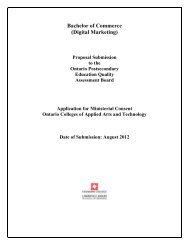Bachelor of Behavioural Science - Postsecondary Education Quality ...
Bachelor of Behavioural Science - Postsecondary Education Quality ...
Bachelor of Behavioural Science - Postsecondary Education Quality ...
You also want an ePaper? Increase the reach of your titles
YUMPU automatically turns print PDFs into web optimized ePapers that Google loves.
emain out <strong>of</strong> long-term care facilities for as long as possible. Additionally, it is aimed at<br />
reducing the use <strong>of</strong> medication and restraints for patients who are already institutionalized. The<br />
number <strong>of</strong> seniors in Ontario is projected to increase by 43% over the next decade and<br />
hundreds <strong>of</strong> new health care pr<strong>of</strong>essionals will be recruited to long-term care homes and<br />
community settings across Ontario.<br />
As part <strong>of</strong> the <strong>Behavioural</strong> Supports Ontario program, there are various projects including the<br />
Aging at Home Strategy where the province <strong>of</strong> Ontario invested $702 million. This funding will<br />
filter through Ontario’s 14 Local Health Integration Networks (LHINs) and will positively impact<br />
the work <strong>of</strong> <strong>Behavioural</strong> <strong>Science</strong> pr<strong>of</strong>essionals.<br />
In 2011, Ontario’s Health Ministry committed to hiring 700 health-care workers specially trained<br />
in how to recognize and deal with behavioural issues in dementia patients as part <strong>of</strong> a new<br />
program to provide better care for aggressive and difficult patients with Alzheimer’s disease and<br />
other neurological disorders. Pr<strong>of</strong>essionals quoted in a 2011 Globe and Mail article detailing this<br />
issue questioned whether the province would be able to find enough qualified pr<strong>of</strong>essionals as<br />
the training is rarely <strong>of</strong>fered. This degree will help to fill that gap.<br />
The Alzheimer Knowledge Exchange Resource Centre states that over 65% <strong>of</strong> long-term care<br />
residents have dementia <strong>of</strong> mental health issues. Mental health issues greatly affect not only<br />
this group <strong>of</strong> individuals but also the general population where mental health conditions,<br />
particularly anxiety and depression, are the fastest rising causes <strong>of</strong> workplace disability. It is<br />
estimated that mental health disorders cost the Canadian economy approximately $53 billion<br />
annually. There is a strong link between mental health and addiction issues where<br />
approximately 20% <strong>of</strong> people with a mental disorder have a co-occurring substance use<br />
problem, and one in ten Canadians 15 years <strong>of</strong> age and over report symptoms consistent with<br />
alcohol or illicit drug dependence. As such, since 2003 the Ontario government as increased<br />
funding to community mental health services by 80% and there has been a 49% increase in<br />
funding towards addiction programs.<br />
Ontario is not only aiming to improve mental health supports for adults but also children and<br />
families. In 2011, the government released a comprehensive mental health and addictions<br />
strategy aimed at providing high-quality services for 50,000 children and youth including early<br />
identification and support, and helping vulnerable kids with unique needs. The government <strong>of</strong><br />
Ontario will invest $257 million over the next three years.<br />
This degree is a progressive step toward meeting these demands. It draws its strength from:<br />
<br />
<br />
recognition <strong>of</strong> the inter-relatedness <strong>of</strong> social, cultural and economic factors in<br />
determining the value <strong>of</strong> the <strong>Bachelor</strong> <strong>of</strong> <strong>Behavioural</strong> <strong>Science</strong> program as an addition to<br />
the available educational <strong>of</strong>ferings in behavioural science and an opportunity to build on<br />
an area <strong>of</strong> Humber’s strength;<br />
an analysis <strong>of</strong> other programs <strong>of</strong>fered by Ontario postsecondary degree granting<br />
institutions and the conclusion that there is an opportunity to <strong>of</strong>fer a broader and more<br />
contemporary program in behavioural science. The proposed program <strong>of</strong>fers a strong<br />
theoretical basis which fosters resiliency, flexibility and critical thinking in a fast-changing<br />
social and community services landscape. It prepares students with sought-after<br />
behavioural approaches, research, and interpr<strong>of</strong>essional skills, recognizing that the<br />
highest paid jobs to continue to be filled by those with degrees;<br />
<strong>Bachelor</strong> <strong>of</strong> <strong>Behavioural</strong> <strong>Science</strong> Section A, Page 13
















